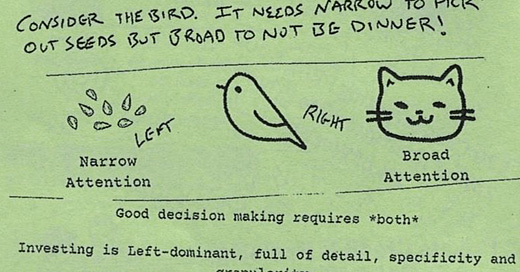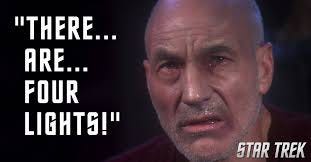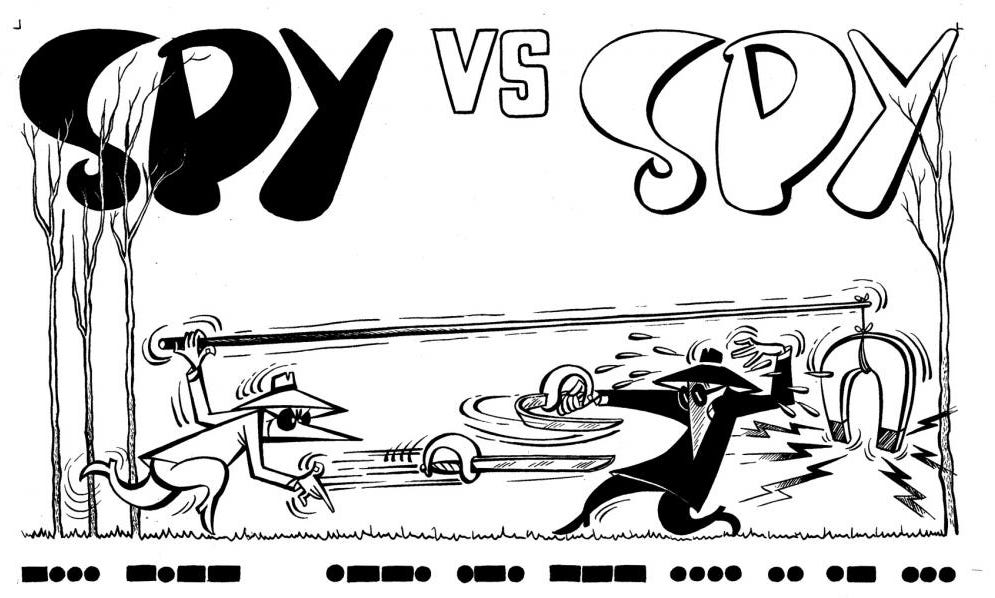Last week I published a piece about how I see the world of finance, markets, politics, and what we all might call “Global Macro” in order to sanitize it’s representation of billions of lives. It was bleak. The TL;DR of the TL;DR.
Who you trust matters, because it’s a black hat/white hat world out there, and the black hats are winning.
***CRACKS KNUCKLES***
First, I want to talk about metaphysics and attention, and then, I want to talk about applying those metaphysics of attention to our current world, which is in the middle of a Semantic War.
NOTE: You had your chance to sign up to the “Finance ONLY Please” sub-category of this email list. You can go back and unsub from the Full Nadig (tm). Also I’ll never know if you hit delete right now. It’s a Sunday for Pete’s sake.
The Metaphysics of Attention
I got asked four separate times last week what my metaphysics were: that is, how I see the nature of reality and the human condition. As someone who writes a lot about finance and meditation, it seemed worth answering:
First Principles: I am either nothingness, or awareness inside a black box, peppered with sensory input. That’s the baseline.
From that blank awareness (a very definitive cognitive state, that just happens to be empty), I find both solipsism (I am all that is real), and monism (everything is all that is, but it’s all one thing including me). (RABBITHOLE: So far the preponderance of evidence is that I don’t exist, except as part of everything, which means we’re all the same thing anyway. This mind-bender bridges Thomas Merton and John Wheeler just fine, by way of Heinrich Pas and Jed McKenna.)
EVERYTHING on top of that… like everything, including everything I’ve ever seen, done, felt or thought, is essentially a cognitive trick to make navigating complex dynamic systems (the world as presented, and our species constraints/gifts) easier. (RABBITHOLE: When consciousness reboots, the first thing that floods in is stories, even before there’s an observer. It’s story all the way down.)
What that means (for me, find your own meaning) is that in moments of consciousness, where I feel like I have agency (as opposed to, say, dreaming, or trance states), the only thing that matters is attention. The more time I spend in meditation, the more clear it is to me that there is only right now. You can tell a story about the past, but you can only encounter that story in the present. Same for all your plans and worries about the future. There is only the present experience.
(RABBITHOLE: At the “woo” level this shows up in Vipassana meditation, and frankly all other kinds of meditation if you really do the work. Paying attention — really paying attention, where there is literally no other awareness but the object of meditation, took me forever and feels like step 1. In Buddhism it’s Samadhi - single pointed awareness. In Christianity it’s nepsis — the watchful attention brought about by the Jesus Prayer, or the single word mantras of the Cloud of Unknowing. There are parallels in Jewish and Islamic contemplative traditions as well, but I haven’t practiced those).
But What Kind of Attention: The McGilchrist Brain
If attention is all we get, it’s probably worth understanding the different ways we use our only gift. For me, the most important framing metaphor helping me navigate life the last half-decade has been the been the divided brain.
(RABBITHOLE: Not in the way you learned in school, but in the incredibly nuanced and rich way presented by Dr. Iain McGilchrist in his 1,600 page Opus, The Matter With Things. Tom Morgan wrote a great cheat sheet for it, and the book is absolutely worth the months it will take to give it a surface read, and the years it’s taken to get down the rabbitholes. I am utterly uninterested in whether there’s materialistic perfection in his diagnosis — even as metaphor it’s too accurate for me to dismiss.)
Here’s the Zine version:
In short: Left brain narrow, persnickety and technical, sure of it’s separateness and scarcity, right brain broad, open and alert, aware of the whole in all its abundance.
The major thrust of McG’s work is to document his diagnosis of the western world as suffering from left-brain capture, highlighting all that we have lost and all that we miss living our lives in left-brain dominant thought. I’ve tried to embody a simple lesson: Don’t use left-brain thinking — the part that reads and studies and classifies and “knows things” and contains most of “me thinking” — to live what is primarily a right-brain existence — natural open and present reality and the state of “what it’s like to be human.”
Practically speaking, that’s meant meditating, spending self-less time in the woods, making things with my hands, or exercising in some mindful way. It’s been transformative, improving my health, happiness, relationships, and honestly, how people and things now seem to show up in my life. ***** would recommend. AAA+.
But…
carrying that sense of calm wholeness and radical acceptance— the Silence Beyond Self — back out into the ridiculously artificial storytelling world of human society rarely seems to work. 10 Seconds after firing up the browser, I’m inundated with INFORMATION and FACTS and LANGUAGE and DATA and that just scratches my left brain with a toothbrush so hard (especially with the dopaminergic hacks the techbros have gotten so good at). This is all foundational to McG’s diagnosis but it’s very hard to retain metacognitive awareness when your doomscrolling.
Clearly, some sort of balancing act is required, and one which, no matter how much I meditate, doesn’t just magically happen.
Outcome Orientation
A very simple answer came this week from Cedric Chin at Commoncog in a piece called “Outcome Orientation as a Cure for Information Overload”. I recommend the whole thing, but here’s the glamour shot:
At all times, whenever you are doing something or reading something, you should ask yourself the question:
“What is the outcome I am trying to achieve here?”
You may then continue with the action or consumption if you wish, but you must answer the question honestly first.
The point is not to control your time allocation, the point is to always be aware of why you are consuming something, as you are consuming it
That’s it. The point is not to control your time allocation, the point is to always be aware of why you are consuming something as you are consuming it. If you do this, you will automatically change your time allocation as a result.
This seems stupidly simple, but it’s actually really hard to do.
Cedric is talking about this specifically in the context of dealing with information overload, which is great. But I actually don’t think it goes nearly far enough. It’s not just intention, and its not just paying attention.
It’s paying attention with intention.
That’s my metaphysics. At least, my Ontologically Aspirational Metaphysics. Use my balanced attention on purpose. Honestly, it’s required a bit of “Reverse McGilchristing.” I’ve spent so much time trying to get my left brain to shut up, sometimes I forget that these meatsacks have a left brain for a reason.
The challenge then, in processing the endless stream of garbage coming into our lives, is to sort out what matters. This is something I felt like I was good at in my youth: quickly and accurately sorting the world into what matters, and what doesn’t. This is relevance realization — knowing what to pay attention to and why — and it’s is a big part of why humans are cool. Predator vs. Prey. Good food vs. spoiled. And the buckets and what we call them matter. “Red” and “Blue” are less useful berry-distinctions than “edible” and “poisonous.”
While I’m still good at parlor trick relevance realization — scanning data for gems, engaging with novelty effectively — I’ve deliberately tried hard (at least since the accident) not do this with people. To divide them into in-groups and out-groups as a cognitive shorthand to minimize how much time I have to dwell in the stream of information, if nothing else.
But I’m not sure that really works anymore, no matter how much I try to practice love and hope. As much as I want to embrace monistic universal love, and will still try for peace, I get to choose who I spend my time and attention on.
Right Action & The Semantic War
As I was once told by a meditation teacher in a very solemn setting: “So you’ve seen some sh&t. Are you going to get off your f#$king ass and do something about it?”
In Buddhism, this “now what” is often talked about as “Right Action” — what do we DO out there in the seeming-world of other people to make things better. To help the long arc of human flourishing nudge upwards, and to erode the suffering of the world?
From my reality tunnel, the actual thing on my doorstep isn’t jackbooted thugs. It’s a semantic war:
In semantic war, words are the weapons. I’m not making a political point about Denali or Fort Bragg — every party in power all over the world renames monuments and state property and organizations. It’s how we ended up with a Space Force and a Kennedy Center.
But there’s a big difference between an institution renaming property, and insisting that the rest of the world just decide to call a body of water something made up. The “Gulf of America,” or the lists of banned words like “woman” from government websites are no different than the scene where Captain Picard on Star Trek: TNG is tortured solely to get him to deny a simple truth.
It’s not “silly.” It’s not a “distraction.” It’s not an “error” that they’ll fix here and there when outcry is strong enough. It’s not the same as ignoring someone’s pronouns (that’s just means you are personally, individually and deliberately being an asshole). This is Orwellian mental assault.
The Battles in this war are to shift Common Knowledge. The most powerful force in the world isn’t Nuclear Weapons or even Love. It’s Common Knowledge. If you can change what “everybody knows” then you have changed the world. Here’s how Ben Hunt described it 13 years ago:
The power source of Common Knowledge is not the crowd seeing an announcement or a press conference. The power source of Common Knowledge is the crowd seeing the crowd seeing an announcement or a press conference. This is why sitcom laugh tracks exist. This is why American Idol is filmed in front of an audience. This is why the Chinese government still bans any media mention of the Tiananmen Square protests more than 20 years after they occurred. The power of a crowd seeing a crowd is one of the most awesome forces in human society. It topples governments. It launches Crusades. It builds cathedrals. And it darn sure moves markets.
This is the intent of all the silly “Gulf of America” and “RedWhiteAndBlueLand” BS. Everyone knows it’s silly now. But if enough people to say it in front of enough people, that’s what changes reality. The Overton Window shifts, and what was universally considered insane (Lets make Canada a state before Puerto Rico!) becomes a Thanksgiving dinner conversation.
How you protect yourself, your assets, your family and your clients in the middle of this semantic war isn’t obvious. It’s tricky. Once we step outside Solipsism, we interact with people and institutions. Our success — in whatever endeavor we’re pursuing — will depend on how they respond to the chaos.
In short: you need to pick your partners very very carefully, and honestly, very very quickly. As institutions norms and structures dissolve, not only will it be hard to know what’s real, it’s going to be very hard to know who you can actually trust. Not just “they tell the truth” or “they won’t break this law” kind of simple “trust”, but “when presented with ambiguity, they will make decisions that I would understand and would actually be in my interest.”
That’s a tough ask.
Black Hats & White Hats
That’s why I’ve decided that, as crass or as simplistic as it may seem, to put a few labels of my own on the world.
White Hat: People and institutions that feel like they are pro-human-flourishing/anti-human-suffering.
Black Hat: People and institutions that feel like they put those second, or even parallel to the pursuit of money, power and influence. Mammon and Moloch.
Let me be excruciatingly clear: I am not holding myself out as some kind of white hat moral scion who has done and will do no wrong. While I ascribe to White Hatdom, I have and will make bad choices, hurt people, and screw stuff up. I’m a mammal.
Both groups are going to do bad things, and good things. Both groups will have good actors, and bad actors. Despite their coding, they don’t really mean “evil” and “good” in some broad, moral sense. They do the work of “Good guys” and “Bad guys.” But mostly, they are a Hollywood pastiche. They are Spy vs. Spy:
For those of you under 50, Spy vs. Spy was a regular cold-war era strip in MAD Magazine. No words are ever included, but it’s clear who the “good guy” was — the one in the white hat of course. They both do horrific stuff to each other each panel. But at a glance, you knew the game. And above all else, nobody — not even the spies — seemed to take it all that seriously. They know it’s just a game, no matter how cartoon-lethal.
The genius of the comic (coming from a Cuban chased out by Castro) was that he never even hinted at what either side was fighting for, or who they were. That was for us to decide.
Discerned Alignment
Who gets the white hat is a matter of discerned alignment. My definition of White Hat (pro-human-flourishing/anti-human-suffering) seems simple, but discerning who or what aligns with this is hard. So I choose to rely on yet-more-shortcuts… I pay attention to what they say, what they do, and ideally, to how I feel when I am with them. If those are aligned, well, that’s a good start. But ultimately discernment is always personal, always a right-brained call about a left-brain sort. Always just a “gut check.”
My version of a white hat may not be yours, and that’s cool. But I’m guessing you find the world just as confusing as I do, and some level of semantic sort is going to be helpful in navigating the coming chaos.
My humble request (for all our sakes) is this: know what it is your seeking alignment with, and then put real time and attention on making sure you’re discernment is as sharp as it can be. The old shortcuts — party, country, company, culture, caste — just don’t seem to have much discernment power anymore.
Disclaimer: Not one iota of this went anywhere near AI. I used Perlexity.ai to find some links.







The Banality of Evil
Really enjoyed this! I’m curious why you say people need to pick their partners “very very quickly”— is that a result of common knowledge eroding / changing faster than it has before?